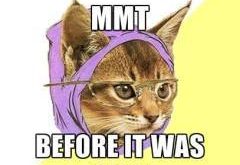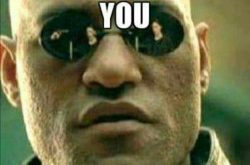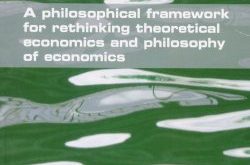[embedded content] Advertisements
Read More »What austerity preachers do not get
What austerity preachers do not get We are not going to get out of the economic doldrums as long as we continue to be obsessed with the unreasoned ideological goal of reducing the so-called deficit. The “deficit” is not an economic sin but an economic necessity … The administration is trying to bring the Titanic into harbor with a canoe paddle, while Congress is arguing over whether to use an oar or a paddle, and the Perot’s and budget balancers seem eager...
Read More »Wren-Lewis’ bizarre critique of MMT
Wren-Lewis’ bizarre critique of MMT Now we can see why MMT is so popular … We are in an MMT world, where we should be using fiscal policy and not worrying about the deficit, but policymakers don’t understand that. I think most mainstream macroeconomists do understand this, but we are not often heard. The ground was therefore ripe for MMT. Policymakers following austerity when they clearly should not annoys me a great deal, and I am very happy to join common...
Read More »Wren-Lewis and the dangerous MMT
Wren-Lewis and the dangerous MMT Professor Simon Wren-Lewis recently wrote: “The dangers of pluralism in economics: the case of MMT” … Wren-Lewis argues that MMT concepts can be explained using mainstream terminology. Since I tend to use fairly standard terminology, I cannot disagree with that argument. However, I would phrase it differently. Mainstream discussion of fiscal policy is almost invariably clouded with theoretical junk (“fiscal sustainability”,...
Read More »IPA’s weekly links
Guest post by Jeff Mosenkis of Innovations for Poverty Action. Markus Goldstein reports on a study from India which finds that paying respondents for their time participating might change their responses. There’s a bipartisan bill to create a new U.S. overseas development finance agency. It would combine several private sector-focused functions that currently exist across different agencies, offer higher spending caps, and would be allowed to make equity investments. There’s a long and...
Read More »On testing in a non-repetitive world
On testing in a non-repetitive world The incorporation of new information makes sense only if the future is to be similar to the past. Any kind of empirical test, whatever form it adopts, will not make sense, however, if the world is uncertain because in such a world induction does not work. Past experience is not a useful guide to guess the future in these conditions (it only serves when the future, somehow, is already implicit in the present) … I believe...
Read More »Re-theorizing the Welfare State and the Political Economy of Neoliberalism’s War Against It
This paper argues neoliberalism is engaged in a war against the welfare state. At issue are competing views regarding the size of the welfare state and how it should be organized. In waging this war, neoliberalism seeks to politically discredit the traditional welfare state and change the economic structure so that the latter becomes unviable. [...]
Read More »The biggest trouble with modern macroeconomics
The biggest trouble with modern macroeconomics The trouble is not so much that macroeconomists say things that are inconsistent with the facts. The real trouble is that other economists do not care that the macroeconomists do not care about the facts. An indifferent tolerance of obvious error is even more corrosive to science than committed advocacy of error. Paul Romer New-Classical-Real-Business-Cycles-DSGE-New-Keynesian microfounded macromodels try to...
Read More »Keynes — en sällsynt fågel
Keynes — en sällsynt fågel Alfred Marshall skrev en gång att “bra ekonomer är sällsynta fåglar.” Det stämmer verkligen. En av dessa sällsynta fåglar var definitivt John Maynard Keynes. Och nu har den norske ekonomiprofessorn Björn-Ivar Davidsen skrivit en bok om denne sällsynt kompetente ekonom, filosof, statstjänsteman, spekulant, utopist, universitetsmecenat, konstsamlare, med mera, med mera. I boken får vi följa med på en resa i Keynes’ biografiska...
Read More »Money and monetary stability in Europe, 1300-1914
By K. Kıvanç Karaman, Sevket Pamuk and Seçil Yıldırım-Karaman This article first appeared at Vox There is a notable lack of long-run analyses of monetary systems and their stability. This column addresses this gap by looking at the monetary systems of major European states between 1300 and 1914. The evidence collected suggests that, despite many switches between standards and systems, fiscal capacity and political regimes ultimately shaped patterns of monetary stability. Theories of monetary...
Read More » Heterodox
Heterodox








